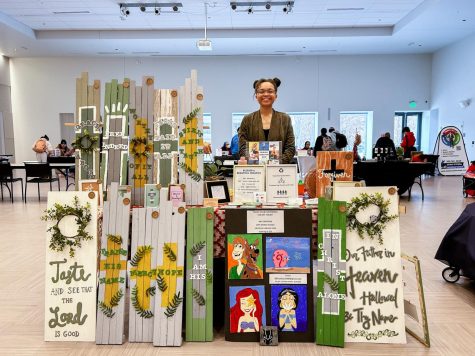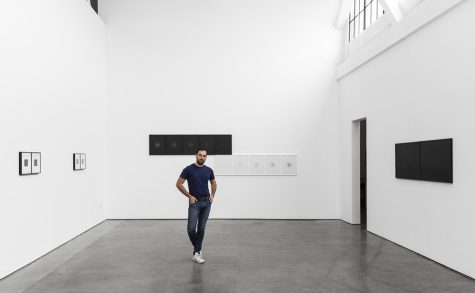Music: A History of Dischord, Part II
February 27, 2013
Welcome to A Brief History of Western Music, Part II. As I explained last week, in Part I, the colloquial term “classical music” actually covers a wide variety of style periods, each with its own distinctive philosophy and approach to sound.
Last time, I took you through Antiquity, with the Egyptian song-lyric gods Ra, Hey, Yeah and Baby; Gregorian Chant, which laid the foundation for bands such as Black Sabbath and Metallica; the Middle Ages, when hipsters first invented wrong notes; and the Renaissance, when performers bravely got on stage without actually knowing how to play their instruments.
Last time, I promised to answer these questions: What is classical music, and why should you care? Who were Mozart, Bach, Beethoven and Brahms? Is it true that jazz musicians basically just play a lot of wrong notes? And what exactly is the point of opera, anyhow?
Any questions? No? Who am I kidding — I can’t hear you anyway. Without further ado, let us jump into:
Baroque:
Just like the Renaissance, the Baroque period was a time of great activity. During this time, musicians were beginning to codify chords and melodies into the system of harmony with which we are familiar today.
The composer J.S. Bach is a famous Baroque composer and organ virtuoso (literally, “one who plays very fast”). He created a body of work that includes some of the most beautiful and expressive examples of Western music.
However, the Baroque also produced what has become the most hated and feared of all musics: black metal. Just kidding — I am talking about opera.
In opera, singers and musicians perform a theatrical dramatic work that combines text, instrumental music and song. The most important type of song in opera is the aria, which is colloquially understood to mean “a very long-winded and repetitious song.”
In fact, the word “opera” itself means “an unnecessarily long musical and performance narrative in which normal events such as the rising of the sun are noted by singing specific arias in honor of that event.”
For the record, I’m a huge fan of opera, not only because I think the storylines and staging are interesting, but also because any form of narrative which uses gratuitous displays of vocal technique as a primary means of solving conflict has my vote.
Classical:
Building upon the newly codified system of harmony developed in the Baroque, Classical musicians created music that presented and resolved melody in ways that emulated classical Greek and Western philosophy.
One of the most exciting classical musicians was the keyboardist Thelonious Mozart. He wrote tons of music and took improvisation to a new level, but he was insane. Mozart was famous for standing up during other people’s solos, talking to himself onstage and even leaving to go home in the middle of a performance.
Eventually, Classical musicians got tired of listening to Mozart, and decided to take it in a different direction. They decided to quit school and used their remaining money to found a small computer company with the hopes of making it big one day. No, wait — I’m thinking of Bill Gates.
Romantic:
During the Romantic period, the focus shifted from melody and harmony to, like, the vibe, you know? It was, to quote the famous French composer Debussy, “real far out, man.” (Fun fact: The Beatles actually stole the song, “Lucy in the Sky, with Diamonds,” from Debussy).
The Romantic period also included many refinements in instrument technology, especially keyboard instruments. The keytar, for example, was invented in 1856, and the Hungarian composer Franz Liszt is considered to be the first great keytar virtuoso.
Liszt contributed a lot to modern rock music. He was the first musician to invent the idea of trading fours, and his theoretical treatises on guitar shredding and keytar pitch bender technique were widely circulated. Liszt was also the first musician to popularize the tradition wherein audience members throw undergarments onto the stage in what is considered a rather bold display of endorsement.
Jazz:
I once went to a jazz concert during which one of the performers referred to jazz as “indigenous North American music.” It’s true: jazz could have only been created in the United States. For the purpose of this discussion, let’s ignore the fact that almost all of the “indigenous North American” culture was destroyed by the American settlers.
One of the most unique things about jazz is the swing. Swing is a special form of rhythm, because instead of the normal “buh duh duh duh,” swing beats instead sound like “buh duh duh duh” or “buh duh duh duh.”
Do jazz musicians just play a lot of wrong notes? Of course they don’t. That would sound terrible. The trick to jazz is to mix in some right notes with the wrong ones so that the listener thinks you know what you’re doing.
In order to separate the “hip” from the “squares,” jazz musicians coined their own language. For example, really good cool-looking jazz players were called “cats.” Other animal names, such as “dog,” “roach” and “lizard,” caught on less well.
The other rite of passage for jazz musicians was becoming addicted to heroin. Somebody might have been able to play like Charlie Parker, but if he couldn’t shoot up like Charlie Parker, he was a nobody. Some greats, like Chet Baker and Bill Evans, spent as much time perfecting their needle technique as they did working on their scales.
When it first started, jazz was considered to be decadent popular music. Teachers and parents banned children from listening to it in order to protect them from the powerful, corrupting influence of swing.
In the modern era, it’s a lot easier to avoid the decadence of jazz. Today, jazz is mostly consigned to elevators and business management commercials, so as long as you avoid those, you’re safe.
Conclusion:
“Classical music” is really a misnomer, because the term encompasses a wide variety of styles and time periods.
There is an idea that “classical music” is extremely intellectual and refined, but it’s just not true. As we have seen, classical musicians were just as crazy, wild and — shall we say, “romantically” — oriented as musicians today.
So the next time your parents or friends get on your case about your loud/obnoxious/profane/weird music, just tell them, “Hey, it’s in the tradition of Classical music.” If they don’t believe you, sing them an aria.







![Simmons said the biggest reasons for her success this year were “God, hard work, and trusting [her] coach and what she has planned.”](https://theeasterner.org/wp-content/uploads/2024/05/image1-1-1200x800.jpg)









